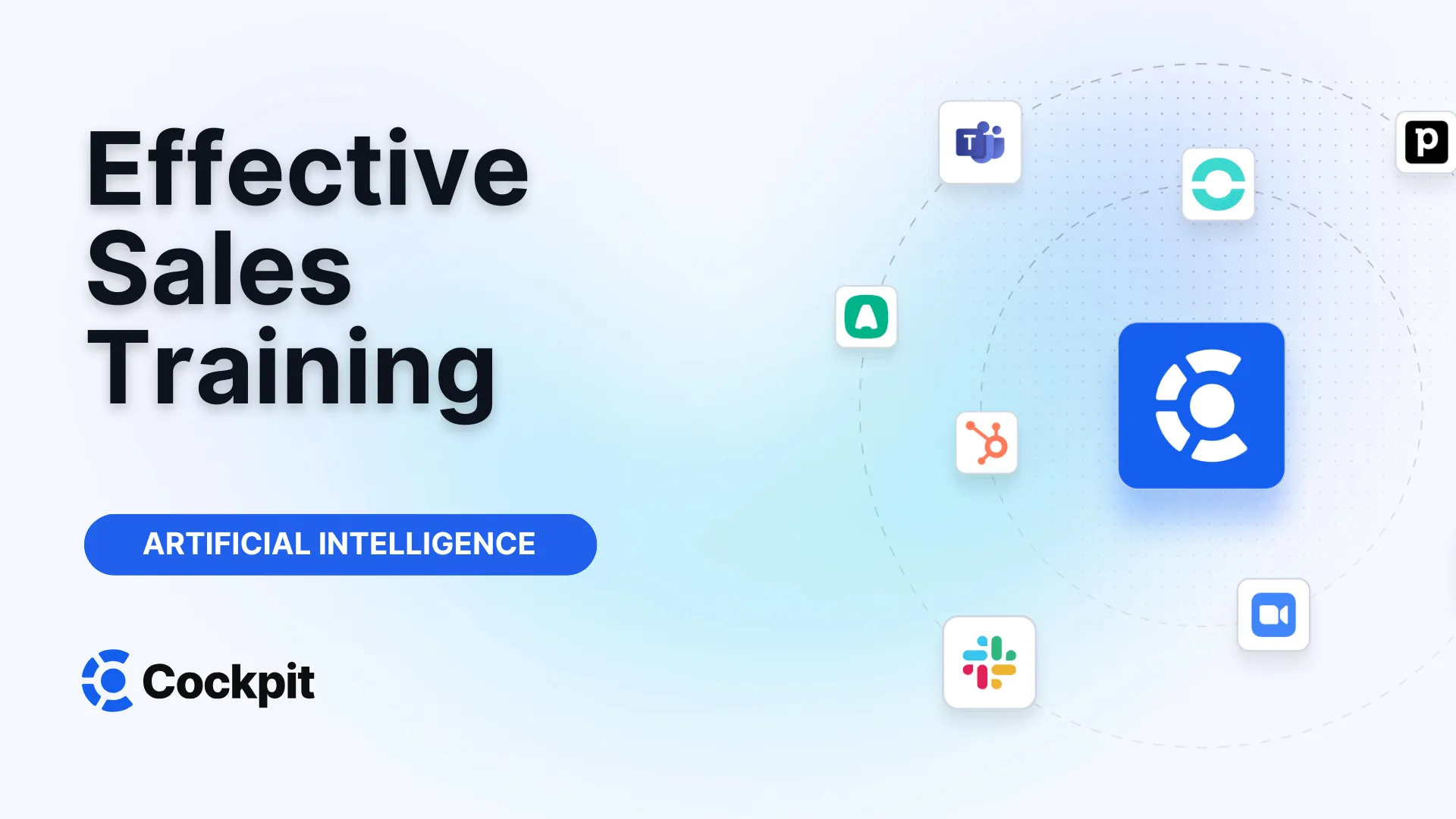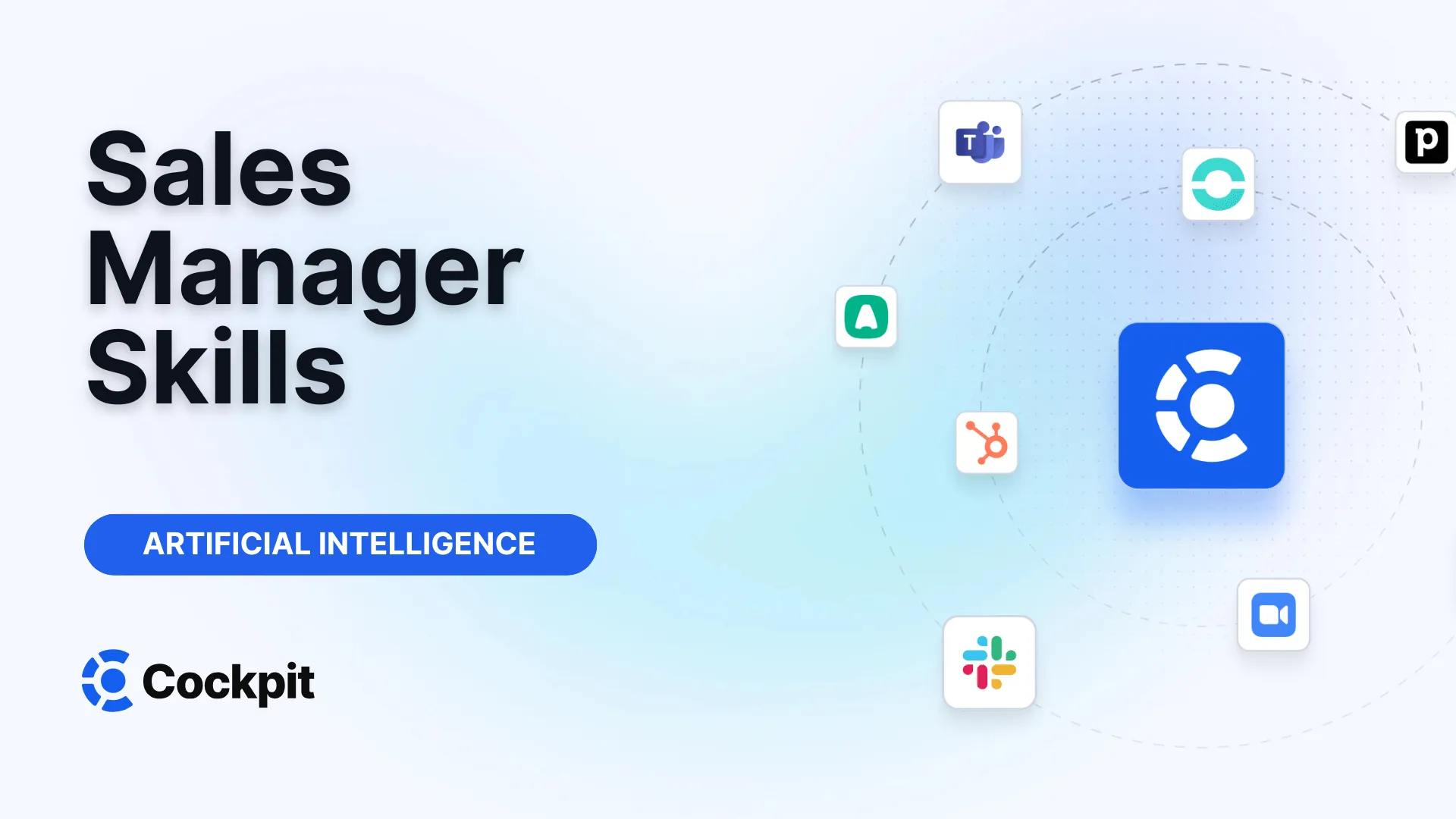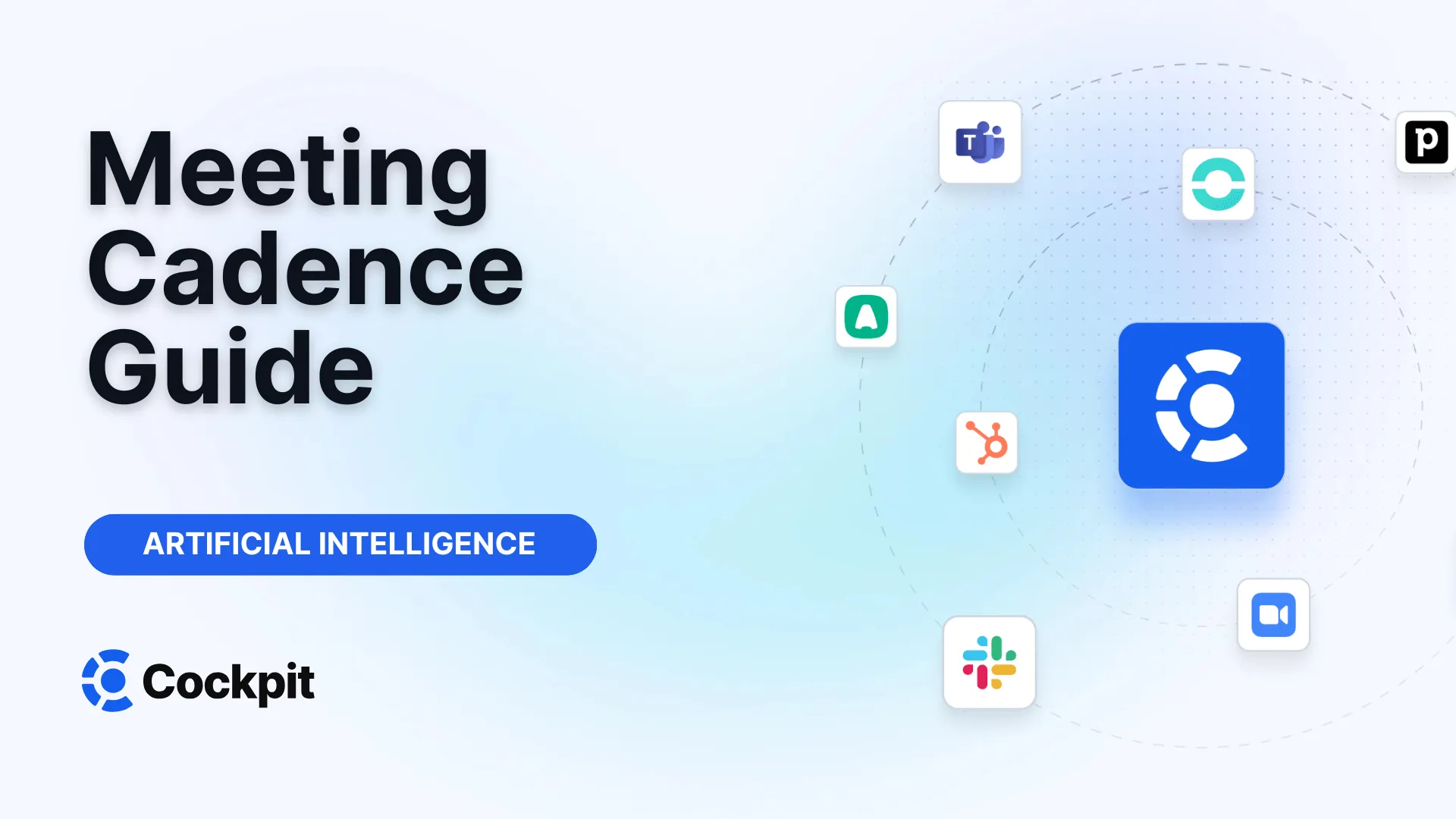Optimize your sales force in just a few clicks

Thousands of sales teams boost their performance with Cockpit. Why shouldn't you?
Explore CockpitSummary
Are your sales teams struggling to reach their quotas? Do you feel that your sales methods are stagnating while your customers' buying journeys are constantly evolving? How can you transform competent salespeople into an elite sales force that not only meets but consistently exceeds targets? The answer often lies in targeted and impactful training programs designed to sharpen skills, modernize approaches, and inject new energy. Investing in your employees' development is not an expense but a strategic lever for exponential growth.
Why Invest in Sales Training Workshops?
The idea that great salespeople are "born" and not "trained" is a persistent myth—but still a myth. In today’s complex and competitive commercial landscape, even the most natural talents need structure, methodology, and continuous skill updates. Effective sales training has a direct and measurable correlation with company results. According to a McKinsey study, companies that invest more in training their sales teams experience significantly better performance in key skills.
The benefits of a structured training program go far beyond simply acquiring new techniques. They create a lasting transformation that impacts the entire organization. The numbers speak for themselves: companies adopting proven methodologies, such as Sandler's, find that 50% more of their salespeople meet their quotas. Furthermore, 88% of participants report improved sales strategies after training.
Specifically, here are the advantages you can expect:
- Increased conversion rates: Teams better equipped to qualify leads, handle objections, and close deals.
- Improved margins: By learning to sell on value rather than price, salespeople reduce excessive discounting.
- Shorter sales cycles: Better process mastery enables guiding buyers more effectively toward decision-making.
- A healthier and more predictable pipeline: Refined prospecting skills ensure a steady flow of qualified opportunities.
- Common language and systems: A unified methodology facilitates collaboration, coaching, and performance analysis within the team.
- Talent retention: Investing in professional development sends a strong signal that increases engagement and loyalty.
"Companies realize they need to be better. They must invest in their employees if they want exponential growth."
Different Sales Training Methodologies
There is no one-size-fits-all approach to sales training. The choice of methodology depends on your industry, product complexity, sales cycle, and company culture. Understanding the philosophies behind the most popular programs is the first step toward making an informed decision.
Consultative Selling Approach
This method transforms the salesperson from a mere "product presenter" into a "trusted consultant." The goal is not to sell but to help the customer solve a problem. The salesperson asks strategic questions to deeply diagnose pain points and hidden needs. By positioning themselves as an expert providing solutions, they build a lasting trust relationship. This approach, popularized by organizations such as Sandler Training or Richardson, is particularly effective in complex B2B sales where understanding the client’s issues is critical.
Value-Based Selling
Close to the consultative approach, value-based selling goes further by focusing on quantifying and articulating return on investment (ROI) for the customer. The salesperson must demonstrate tangibly how their solution will generate revenue, reduce costs, or mitigate risks for the buyer. It is not just about solving a problem but proving the financial value of the solution. Programs like those from ValueSelling Associates specialize in this approach, helping teams justify higher prices and avoid commoditization.
The Challenger Model
Popularized by the book The Challenger Sale, this model identifies a high-performing salesperson profile: the "Challenger." This type of salesperson does not just respond to expressed client needs—they challenge the client to think differently by providing new perspectives on their industry. The Challenger process rests on three pillars:
- Teach: Provide unique and valuable insights that reframe the customer’s view.
- Tailor: Customize messages to resonate specifically with the customer's priorities and stakeholders.
- Take Control: Guide the customer confidently throughout the buying process without being aggressive but staying direct.
Relationship Selling
Pioneered by institutions like Dale Carnegie, this philosophy emphasizes building authentic, long-term connections. Selling is seen as a natural consequence of a solid relationship and mutual trust. Key skills here include active listening, empathy, interpersonal communication, and reliability. It is a powerful strategy for industries where customer loyalty and word-of-mouth are essential growth drivers.
Methodology Main Focus Ideal For Key Skills Consultative Diagnosing and solving customer problems. Complex B2B sales, customized solutions. Strategic questioning, active listening, expertise. Value-Based Articulating and quantifying ROI for the customer. Competitive markets, high-value products. Financial acumen, profitability analysis, communication. Challenger Providing new perspectives and challenging the status quo. Changing industries, disruptive sales. Market knowledge, persuasion, confidence. Relationship Building trust and long-term connections. Recurring sales, key account management. Empathy, communication, reliability, storytelling.
Choosing the Right Sales Training Program for Your Team
Once you have a clearer idea of the methodologies, it is time to select a program. The best training workshop is not necessarily the most expensive or well-known but the one that best fits your team’s specific challenges.
Assessing Needs and Skill Gaps
First and foremost, conduct a diagnostic. Where does your team excel? Where are the friction points?
- Data analysis: Examine your CRM. Are issues located at the beginning of the cycle (prospecting), the middle (qualification, demo), or the end (negotiation, closing)?
- Individual assessments: Many providers offer pre-training evaluations to identify both individual and collective skill gaps.
- Interviews: Talk with your salespeople and their managers. What challenges do they face daily? Which objections block them most often?
This initial analysis will help you choose a program that precisely targets your weak points, ensuring a better return on investment.
Training Formats: On-site, Virtual, or Hybrid?
The delivery mode is a crucial factor. Each format has its advantages:
- On-site: Ideal for total immersion, intense role plays, and team cohesion reinforcement. Direct interaction with the trainer and peers fosters dynamic learning.
- Virtual: Offers great flexibility and eliminates travel costs. Sessions are often shorter and spread over several weeks, allowing better assimilation and immediate application between sessions.
- Hybrid: Combines the best of both worlds. This can include self-paced e-learning modules supplemented by virtual or on-site workshops for practice and coaching.
Expert Tips
Before committing to a training program, define SMART goals (Specific, Measurable, Achievable, Realistic, Time-bound). For example, instead of aiming for “sales improvement,” target “a 15% increase in conversion rates on qualified opportunities within six months after training.” This will provide a clear framework for measuring success.
Customization and Relevance to Your Industry
A generic training program will have limited impact. The best providers take the time to understand your company, products, clients, and competitive challenges. They tailor case studies, role plays, and examples to your reality. Ensure the trainer can speak your industry’s language and answer questions specific to your market. Customization is key for participants to see the immediate relevance of the training and fully embrace the concepts.
The Pillars of a Successful Sales Training Workshop
Beyond methodology, a quality workshop must cover fundamental skills that form the backbone of any sales performance. Here are the modules you should find in a comprehensive program:
- Prospecting and business development: Learning to identify the right prospects, using modern tools (such as LinkedIn) effectively, and crafting impactful messages that generate interest.
- Mastering the discovery phase: The art of asking open and relevant questions to uncover the real needs, motivations, and buyer decision process.
- Communicating value: Presenting your solution not by listing features but by telling a compelling story highlighting benefits and value for the customer.
- Handling objections: Developing a positive mindset toward objections, viewing them as requests for information, and responding in a structured and convincing way without being defensive.
- Sales negotiation: Acquiring techniques to defend value, negotiate terms without sacrificing margins, and find mutually beneficial agreements.
- Closing techniques: Learning to recognize buying signals and ask for commitment naturally and confidently at the right moment.
Note
Technical sales skills are essential, but never underestimate the importance of soft skills. A good training program also integrates the development of emotional intelligence, interpersonal communication, stress management, and motivation. These qualities often differentiate a good salesperson from an exceptional one.
Beyond the Workshop: How to Ensure a Lasting ROI?
The greatest challenge of sales training is not the event itself but what happens afterward. The Ebbinghaus “forgetting curve” shows that without reinforcement, participants can forget up to 90% of what they learned in just one month. The initial enthusiasm fades, old habits resurface, and the substantial investment you made risks disappearing.
To turn training into sustainable behavior change, a reinforcement strategy is essential. This includes regular coaching by managers, follow-up sessions, and above all, the use of technology to embed new skills in daily practice. This is where conversational intelligence tools become strategic allies.
Measure Impact with Concrete Data Using AI
How can you know if your salespeople are really applying the new methodology learned during the workshop? How can you precisely identify where they still struggle? That is where we come in.
Our AI assistant for sales meetings is designed to be the perfect bridge between training and performance. It records, transcribes, and analyzes every sales conversation, offering unprecedented visibility into practical skill application.
- Objective, fact-based coaching: No more subjective “ride-alongs.” With our AI Playbook, you can track adoption of the sales methodology just taught. The tool analyses whether salespeople ask appropriate discovery questions, handle objections as trained, or communicate the value proposition effectively. Managers can then coach on specific moments in real conversations.
- Continuous reinforcement: By creating playlists of “best moments” (perfect objection handling, exemplary value presentation), you can share best practices within the team, turning every call into a continuous learning opportunity.
- Automation for more coaching: Our Autopilot functionality automatically enriches your CRM with key information from each call. This frees valuable time for your managers, allowing them to focus on coaching and team development instead of administrative tasks.
- Measuring ROI: By analyzing conversation trends, you can directly correlate training with tangible improvements: better price objection handling, more AI-detected buying signals, or stronger alignment with the new value proposition.
By integrating a tool like ours into your post-training strategy, you do not just hope for a return on investment. You build it, measure it, and actively optimize it.
Ultimately, choosing the right sales training workshop is a strategic decision that can redefine your company’s trajectory. It is an investment in your most valuable asset: your employees. By selecting a tailored methodology, a relevant format, and a partner capable of customizing content, you maximize your chances of success. But to ensure that transformation lasts, do not forget the crucial reinforcement phase. By combining world-class training with technology tools that embed new habits, you will not only reach your goals—you will create a culture of high commercial performance.
FAQ - How to Measure the Success of Sales Training?
How do you measure the success of sales training?
Measuring the success of sales training requires a two-pronged approach. On one hand, qualitative indicators, such as participant feedback and manager observation of increased confidence and better preparation. On the other hand, and more importantly, quantitative indicators (KPIs). Before training, establish baseline metrics for key indicators, then track their evolution over the following months. KPIs to monitor include:
- Opportunity conversion rates.
- Average deal size.
- Sales cycle duration.
- Percentage of salespeople meeting quotas.
- Gross margin per sale.
Conversational analysis tools can greatly facilitate this tracking by providing objective data on how learned behaviors translate into concrete results during customer interactions.




